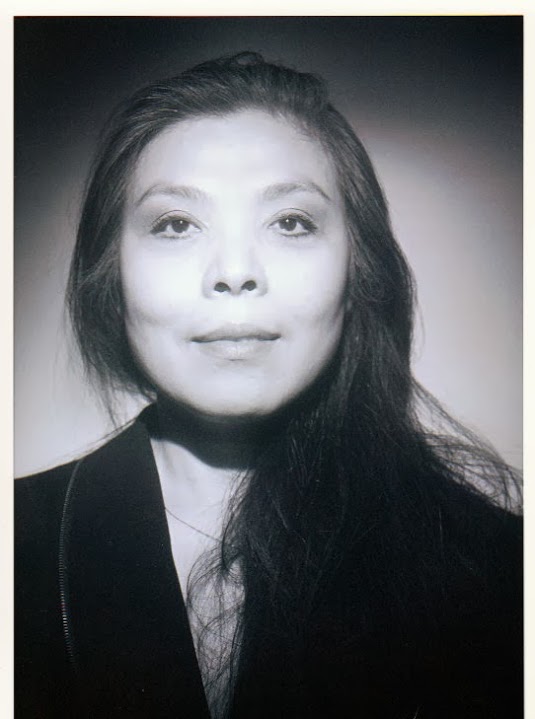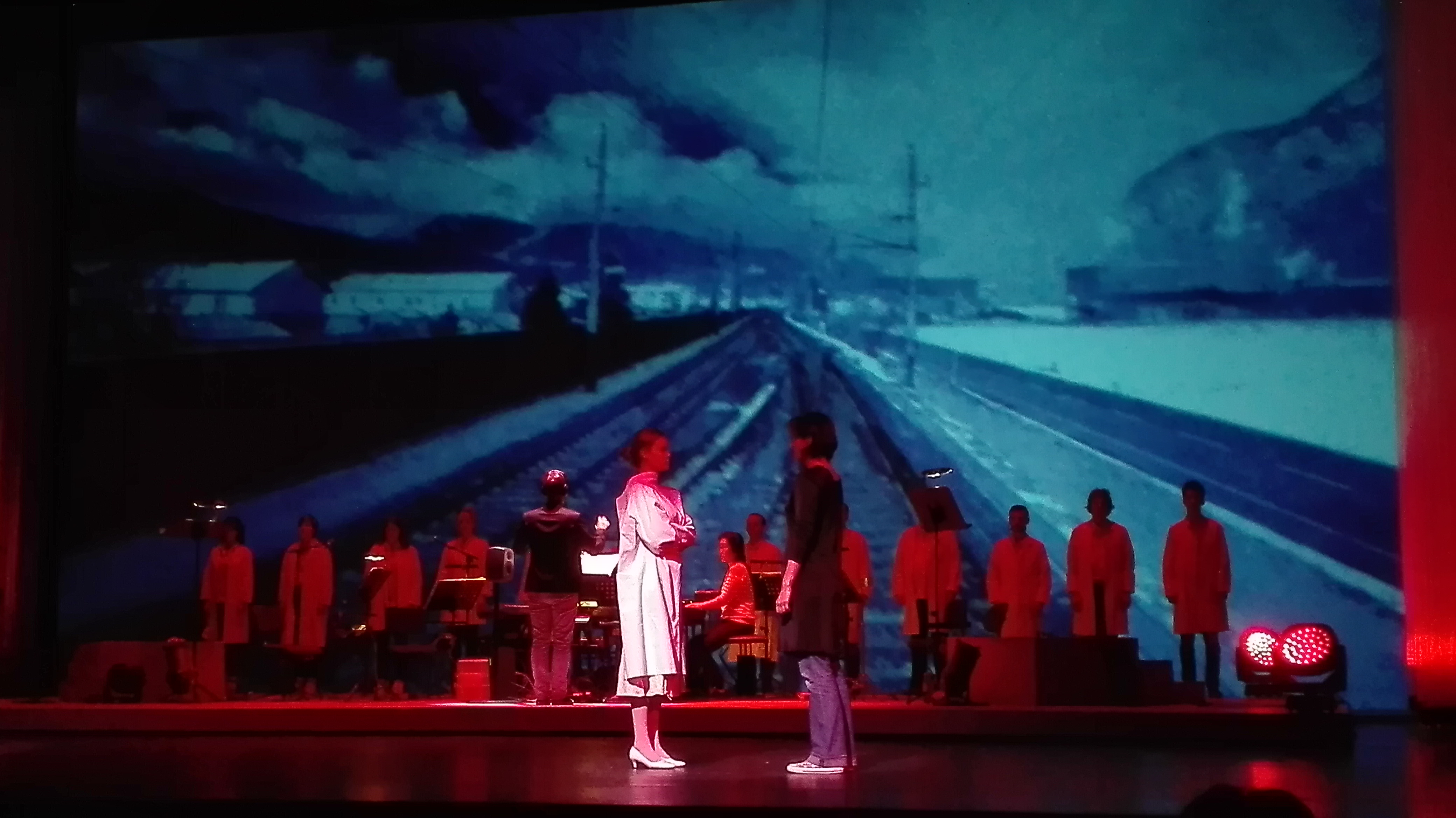|
Qiulin Zhang
Qiulin Zhang (or Qiu Lin Zhang) is an opera contralto of Chinese descent. Zhang was born in 1964 into a family of traditional Chinese Opera singers. Her father was a local opera singer of Qinqiang and play writer. Zhang is the winner of the Grand Prix of the International Contest of Marmande in 1995 and winner of the Masters of French Song in Paris the same year. She appears regularly in European opera houses such as the Toulouse Théâtre du Capitole, Opéra Bastille in Paris, the Dublin Opera, and others in London, Amsterdam, and Madrid. Known for her performances in Wagner's operas, in 2010, she sang Erda (one of her signature roles) in the Paris Opera's first performance of the complete Ring Cycle in 53 years. Career Zhang earned her first diploma from the College of Music of Xi'an, China, in 1984, and was a soloist at the Symphony Orchestra of Xi'an until 1995. Zhang began singing in France in 1989. Educated in Paris at the Schola Cantorum de Paris, Schola Cantorum, and then ... [...More Info...] [...Related Items...] OR: [Wikipedia] [Google] [Baidu] |
Rigoletto
''Rigoletto'' is an opera in three acts by Giuseppe Verdi. The Italian libretto was written by Francesco Maria Piave based on the 1832 play ''Le roi s'amuse'' by Victor Hugo. Despite serious initial problems with the Austrian censors who had control over northern Italian theatres at the time, the opera had a triumphant premiere at La Fenice in Venice on 11 March 1851. The work, Verdi's sixteenth in the genre, is widely considered to be the first of the operatic masterpieces of Verdi's middle-to-late career. Its tragic story revolves around the licentious Duchy of Mantua, Duke of Mantua, his hunch-backed court jester Rigoletto, and Rigoletto's daughter Gilda. The opera's original title, ''La maledizione'' (The Curse), refers to a curse placed on both the Duke and Rigoletto by a courtier whose daughter the Duke has seduced with Rigoletto's encouragement. The curse comes to fruition when Gilda falls in love with the Duke and sacrifices her life to save him from the assassin hired by ... [...More Info...] [...Related Items...] OR: [Wikipedia] [Google] [Baidu] |
Der Ring Des Nibelungen
(''The Ring of the Nibelung''), WWV 86, is a cycle of four German-language epic music dramas composed by Richard Wagner. The works are based loosely on characters from Germanic heroic legend, namely Norse legendary sagas and the '' Nibelungenlied''. The composer termed the cycle a "Bühnenfestspiel" (stage festival play), structured in three days preceded by a ("preliminary evening"). It is often referred to as the ''Ring'' cycle, Wagner's ''Ring'', or simply ''The Ring''. Wagner wrote the libretto and music over the course of about twenty-six years, from 1848 to 1874. The four parts that constitute the ''Ring'' cycle are, in sequence: * ''Das Rheingold'' (''The Rhinegold'') * '' Die Walküre'' (''The Valkyrie'') * '' Siegfried'' * '' Götterdämmerung'' (''Twilight of the Gods'') Individual works of the sequence are often performed separately, and indeed the operas contain dialogues that mention events in the previous operas, so that a viewer could watch any of them wi ... [...More Info...] [...Related Items...] OR: [Wikipedia] [Google] [Baidu] |
Robert Wilson (director)
Robert Wilson (born October 4, 1941) is an American experimental theater stage director and playwright who has been described by ''The New York Times'' as "mericas – or even the world's – foremost vanguard 'theater artist. He has also worked as a choreographer, performer, painter, sculptor, video artist, and sound and lighting designer. Wilson is best known for his collaboration with Philip Glass and Lucinda Childs on ''Einstein on the Beach'', and his frequent collaborations with Tom Waits. In 1991, Wilson established The Watermill Center, "a laboratory for performance" on the East End of Long Island, New York, regularly working with opera and theatre companies, as well as cultural festivals. Wilson "has developed as an avant-garde artist specifically in Europe amongst its modern quests, in its most significant cultural centers, galleries, museums, opera houses and theaters, and festivals". Early life and education Wilson was born in Waco, Texas, the son of Loree Velma (né ... [...More Info...] [...Related Items...] OR: [Wikipedia] [Google] [Baidu] |
The Magic Flute
''The Magic Flute'' (German: , ), K. 620, is an opera in two acts by Wolfgang Amadeus Mozart to a German libretto by Emanuel Schikaneder. The work is in the form of a ''Singspiel'', a popular form during the time it was written that included both singing and spoken dialogue. The work premiered on 30 September 1791 at Schikaneder's theatre, the Freihaus-Theater auf der Wieden in Vienna, just two months before the composer's premature death. Still a staple of the opera repertory, its popularity was reflected by two immediate sequels, Peter Winter's ''Das Labyrinth oder Der Kampf mit den Elementen. Der Zauberflöte zweyter Theil'' (1798) and a fragmentary libretto by Johann Wolfgang von Goethe titled ''The Magic Flute Part Two''. The allegorical plot was influenced by Schikaneder and Mozart's interest in Freemasonry and concerns the initiation of Prince Tamino. Enlisted by the Queen of the Night to rescue her daughter Pamina from the high priest Sarastro, Tamino comes to a ... [...More Info...] [...Related Items...] OR: [Wikipedia] [Google] [Baidu] |
Médée (Cherubini)
''Médée'' is a French language opéra-comique by Luigi Cherubini. The libretto by François-Benoît Hoffman (Nicolas Étienne Framéry) was based on Euripides' tragedy of Medea and Pierre Corneille's play ''Médée''. It is set in the ancient city of Corinth. The opera was premiered on 13 March 1797 at the Théâtre Feydeau, Paris. It met with a lukewarm reception and was not immediately revived. During the twentieth century, it was usually performed in Italian translation as ''Medea'', with the spoken dialogue replaced by recitatives not authorized by the composer. More recently, opera companies have returned to Cherubini's original version. The long-lost final aria, which Cherubini appears to have elided from his original manuscript, was discovered by researchers from the University of Manchester and Stanford University by employing x-ray techniques to reveal the blackened out areas of Cherubini's manuscript. Performances and versions Several versions of the opera were p ... [...More Info...] [...Related Items...] OR: [Wikipedia] [Google] [Baidu] |
Dialogues Of The Carmelites
' (''Dialogues of the Carmelites''), FP 159, is an opera in three acts, divided into twelve scenes with linking orchestral interludes, with music and libretto by Francis Poulenc, completed in 1956. The composer's second opera, Poulenc wrote the libretto after the work of the same name by Georges Bernanos. The opera tells a fictionalised version of the story of the Martyrs of Compiègne, Carmelite nuns who, in 1794 during the closing days of the Reign of Terror during the French Revolution, were guillotined in Paris for refusing to renounce their vocation. The world première of the opera occurred (in Italian translation) on 26 January 1957 at La Scala in Milan. The première of the French-language version took place in Paris on 21 June 1957. The United States première, in English, followed in San Francisco in September 1957. Development Bernanos had been hired in 1947 to write the dialogue for a film screenplay, through Raymond-Léopold Bruckberger and the scenario writer Ph ... [...More Info...] [...Related Items...] OR: [Wikipedia] [Google] [Baidu] |
Oscar Straus (composer)
Oscar Nathan Straus (6 March 1870 – 11 January 1954) was a Viennese composer of operettas, film scores, and songs. He also wrote about 500 cabaret songs, chamber music, and orchestral and choral works. His original name was actually Strauss, but for professional purposes he deliberately omitted the final 's'. He wished not to be associated with the musical Strauss family of Vienna. However, he did follow the advice of Johann Strauss II in 1898 about abandoning the prospective lure of writing waltzes for the more lucrative business of writing for the theatre. The son of a Jewish ''Jewish Telegraphic Agency''. 13 January 1954 family, he studied music in Berlin under |
Hong Kong Arts Festival
The Hong Kong Arts Festival (HKAF), launched in 1973, is a major international arts festival committed to enriching the cultural life of the city by presenting leading local and international artists in all genres of the performing arts as well as a diverse range of “PLUS” and educational events in February and March each year. Genres seen and heard at the Hong Kong Arts Festival include classical music, Chinese music, world music, Western opera, Chinese opera, drama and dance. HKAF presented top international artists and ensembles, such as Cecilia Bartoli, José Carreras, Yo-Yo Ma, Philip Glass, Kurt Masur, Riccardo Chailly, Mikhail Baryshnikov, Sylvie Guillem, Kevin Spacey, Royal Concertgebouw Orchestra, Mariinsky Theatre, Bavarian State Opera, New York City Ballet, Paris Opera Ballet, Tanztheater Wuppertal Pina Bausch, Cloud Gate Dance Theater, Zingaro, Royal Shakespeare Company, Moscow Art Theatre, and Beijing People's Art Theatre. HKAF actively collaborates w ... [...More Info...] [...Related Items...] OR: [Wikipedia] [Google] [Baidu] |
Carmen
''Carmen'' () is an opera in four acts by the French composer Georges Bizet. The libretto was written by Henri Meilhac and Ludovic Halévy, based on the Carmen (novella), novella of the same title by Prosper Mérimée. The opera was first performed by the Opéra-Comique in Paris on 3 March 1875, where its breaking of conventions shocked and scandalised its first audiences. Bizet died suddenly after the 33rd performance, unaware that the work would achieve international acclaim within the following ten years. ''Carmen'' has since become one of the most popular and frequently performed operas in the classical Western canon, canon; the "Habanera (aria), Habanera" from act 1 and the "Toreador Song" from act 2 are among the best known of all operatic arias. The opera is written in the genre of ''opéra comique'' with musical numbers separated by dialogue. It is set in southern Spain and tells the story of the downfall of Don José, a naïve soldier who is seduced by the wiles of th ... [...More Info...] [...Related Items...] OR: [Wikipedia] [Google] [Baidu] |
Opera Canada
''Opera Canada'' is a quarterly music magazine published by Opera Canada Publications. It is the oldest continuously published arts magazine in Canada. It is an independent magazine separate from the Canadian Opera Association. Along with Opera and Opera News, in the 1990s, the magazine was considered to be one of the three major opera publications in the English-speaking world. History In 1960, ''Opera in Canada'' was established in Toronto by Ruby Mercer. It was started as a publication for the 300 members of the Canadian Opera Guild. The publication was meant to be a link between the Guild members and its readers. Mercer served as editor and publisher until 1990. Contents and reception Bibliographic details In 1963, the publication's name was changed to Opera Canada. The magazine was quarterly from 1960 to 1974. In 1975, six issues were planned but only five issues were published. Quarterly publication resumed and continued between 1976 and 2004. Five issues of the magazin ... [...More Info...] [...Related Items...] OR: [Wikipedia] [Google] [Baidu] |


.jpg)




